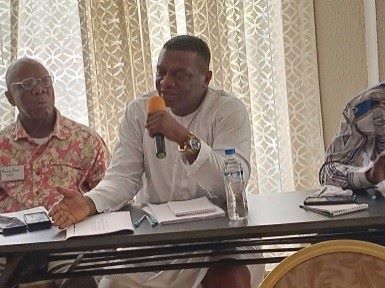For Tropical Countries Convened
PHOTO: FDA C. Mike Doyen
The Indonesian Ministry of Environment and Forest (MoEF) in collaboration with the Interim Secretariat and working group for Broader Market Recognition (BMR) convened the second policy forum in Bali on Broader Market Recognition of National Systems.
The Policy was a follow up to the “Creating Incentives through Broader Market Recognition of National Systems” session at Indonesia Pavilion at CoP27 in Sharm El-Sheikh, Egypt, November 2022, where coalition countries firstly announced its BMR Joint Statement.
The Bali meeting was attended by government, private sector and civil society delegates from Indonesia, Cameroon, Ghana, Guyana, and Liberia alongside representatives of Timber Development UK and the UK forest Governance, Markets and Climate (FGMC) programme, and with technical input from Sustainable Wood Ltd, a UK based consultancy. Due to logistical matters, delegates from Republic of Congo did not attend; however, the delegates are fully updated and support the forum’s processes and outcomes. A full list of those in attendance is attached to this document as Annex One.
The objective of the Bali meeting was to elaborate on and deepen the ownership if the joint statement presented at CoP27. The Broader Market Recognition Coalition (BMRC) consists of tropical countries who presented the joint statement at COP27. Participation in BMRC is voluntary and open to any tropical country with a demonstrable commitment to the implementation of a national forestry system that satisfies agreed standards and principles. The full history and context of the BMR Coalition is attached to this document as Annex two.
Thus far, only the EU and the UK have committed to recognizing these national forestry systems when they are built, and even in these markets awareness of their contribution to delivery of sustainable forestry is limited. Such limited global recognition does not adequately reward tropical countries that invest in national systems for strengthened forest governance. Economic and climate benefits can be significantly improved if more countries are incentivized to implement these systems through easier market access for their forest products.
Participants in Bali fleshed out the details of the Joint Statement into a draft Roadmap that details what BMRC is all about. Sustainable Wood Ltd is leading the process of drafting the Roadmap which will finalize in the second quarter of 2023 through a participatory process involving the 6 coalition members. Key elements of the Roadmap include proposals for a governance structure, inclusive of a governing council and a secretariat, fund raising, principles and preliminarily defined standards for national forestry systems, and the promotion of those standards as well as the products that meet those standards.
The details associated with the implementation of the BMRC ambition were also discussed in Bali. The interim secretariat is responsible for assembling an Action Plan that will be shared with participants by the end of April 2023. Key elements of the Action Plan include steps to finalize the Roadmap, the production of a BMR policy brief (to assist national policy makers), the creation of a website and other communications content, support for actions that build local ownership for BMR, the finalization of BMR principles and standards, and the establishment of a secretariat to lead the next phase of work.
In another development, the Coalition of tropical timber producing countries has released a joint statement seeking Broader Market Recognition of national verification systems.
Accordingly, there is global recognition that forests are crucial for mitigating climate change, which led to COP26 calling to halt and reverse forest loss and land delegation by 2030, and to strengthen support to forest countries that have maintained forest cover. Robust national timber verification systems have demonstrated an ability to effectively counter deforestation and maintain forest cover, and therefore need adequate support from producer and consumer countries to stimulate further uptake.
As a coalition of government, private sector and civil society representatives from tropical timber producer countries, we the undersigned, commit to the development of an international framework to drive transformational change in the forest sector by rewarding good governance with strong market incentives through these measures: Clear market incentives play a critical role in reinforcing producer country efforts to promote sustainable forest management. International frameworks, such as the European Union’s Forest Law Enforcement Governance and Trade (FLEGT) Action Plan, and national certification schemes such as SVLK, acknowledged the power of international markets as a driver for strengthened forest governance.
We hereby advocate for robust national systems, such as those developed through FLEGT Voluntary Partnership Agreements (VPAs), which deliver forest management standards that:
Are developed through inclusive multi-stakeholder processes Ensure compliance with national legal frameworks that include laws that address environmental, social, and economic principles.
Require mandatory nationwide compliance with the agreed standard; Provide opportunity for independent forest monitoring; Are audited by an independent third party, and ensure continuous improvement of the standard and system over time.
The nature of the multi-stakeholder deliberative processes through which these systems were developed, has and will continue to ensure:
More inclusive policy making that considers the rights of all sector stakeholders, including Indigenous People and local communities (IPLCs).
Continuous improvement in forest governance through greater transparency and accountability in the management of forest resources; Strengthened oversight of timber operations due to complementary forest monitoring efforts by non-state actors.
The development of credible national systems for increasingly discerning international markets; Market recognition is important for incentivizing national systems.
The FLEGT licensing system of the EU and the UK currently provides a green lane to timber coming from recognized timber legality assurance systems. Producer countries have been developing robust national systems, and call for these to be widely recognized, including in markets beyond the EU and the UK. There is general agreement that further efforts must be made to ensure that these national systems achieve full international market recognition.

